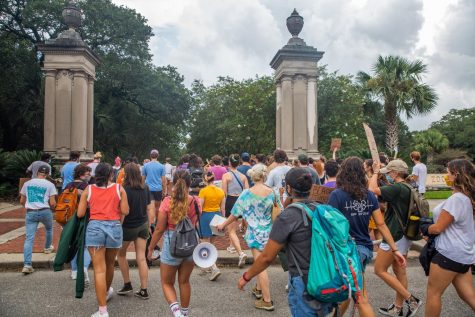I don’t attend protests but I can still fight for justice

Following the tragic murder of George Floyd over the summer, the country saw massive peaceful protests held in several major cities. Living in Houston, Texas, I saw firsthand how powerful these demonstrations were as well as how persistent the protesters were. Day after day, thousands of people continued to show up, refusing to back down in the face of oppression.
When the protests began, I was ready to express my outrage regardless of the consequences that may befall protesters. Unfortunately, I can’t afford to be so bold. For many people, protesting isn’t a feasible option. A few examples are those who can’t afford to take time from work, those with records who can’t afford another arrest, those with certain disabilities and those like me with precarious immigration statuses. As a non-citizen resident, my protest experience is inherently different from any American citizen.
Legally, the Constitution protects the right to protest of any resident in the country. In practice, however, non-citizen protesters face unique, devastating consequences if they’re arrested during a protest. Being arrested puts any immigrant, especially those who are undocumented, in serious risk of deportation.
As a resident of Houston, where Floyd once lived, I wanted desperately to express my solidarity, but my parents insisted that we wait to see the political response to the protests.
On the second day of the protests, when my friend sent me a picture of her busted lip and bloody nose, I knew that protesting was a risk I couldn’t take. My parents were also right to gauge the response, because soon after the protests began, Immigration and Customs Enforcement agents were deployed and arrest rates of protesters soared.
Despite the dangers involved, I felt guilty about not attending the demonstrations when nearly every protester in attendance was risking so much.
Most of my friends who attended the protests discouraged me from participating and argued that my safety was more important. After all, there are so many other ways to fight against racism. I did everything I could to make up for the fact that I wouldn’t be attending any demonstrations. I read every anti-racist text I could find, called out ignorance, donated to bail funds and wrote as much as I could to raise awareness, including a guide for immigrants who did choose to protest. Nothing alleviated my guilt.
Everything came to a head when someone, who happened to be a citizen, told me about a demonstration being held near our neighborhood and asked me to attend. As I awkwardly explained why I didn’t attend protests, I could feel her judging me. She told me she understood my fears but that I should be using my position of privilege to show up in every possible way. With that comment, she reaffirmed all the regret I felt about my actions, or lack thereof.
The majority of people I know haven’t attacked my decision to refrain from protesting, but the words of the few that do pierce deep. I am aware of my privilege and the last thing I want to do is be silent about these systems of oppression.
After returning to campus, I felt that guilt once more when I chose not to participate in the Abolish TUPD protest.
Then again this past week, as the election results held the entire country in suspense, that same guilt began to resurface as I imagined what our country could look like in a few short months. When oppressive policies are passed or when another innocent person of color becomes a victim of police brutality, would I find it in myself to participate in demonstrations?
I’m not sure my answer will be “yes” anytime soon.
I admire every non-citizen who puts themselves at risk to protest. I just can’t bring myself to do the same, but I don’t want to feel guilty about it anymore. I’m not going to fault myself for choosing safer forms of activism.
Of course, if you’re able and willing, expressing solidarity through physical demonstrations is a crucial part of any movement for change. However, if you’re unable to do so, other forms of activism are just as valid. Protesting is just one avenue and it’s those with citizenship privilege who should leverage it. Most importantly, anyone with privilege should refrain from judging under-privileged groups for how they choose to advocate.
The best that we can ask of anyone is that they keep fighting for justice, no matter what that looks like for them.
Your donation will support the student journalists of Tulane University. Your contribution will allow us to purchase equipment and cover our annual website hosting costs.


